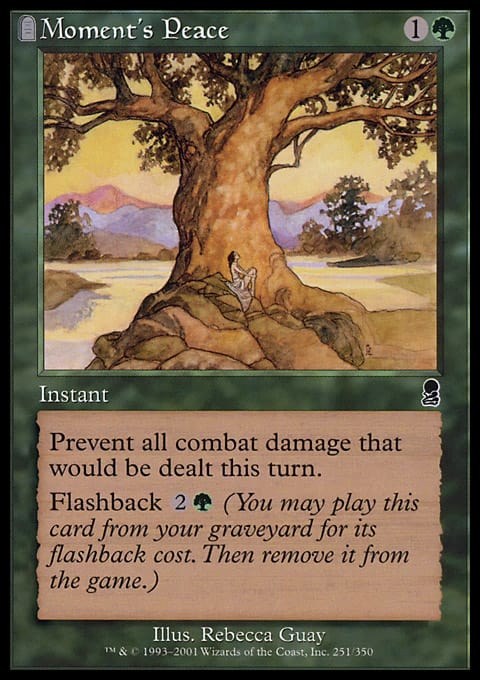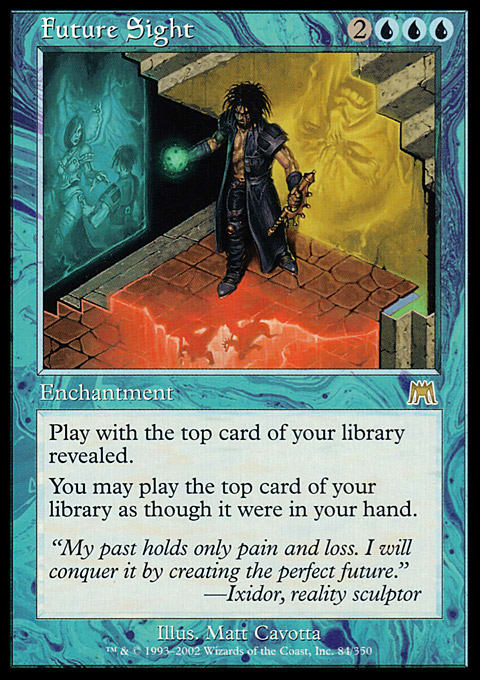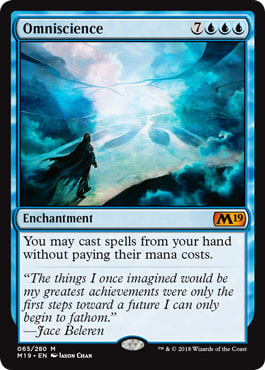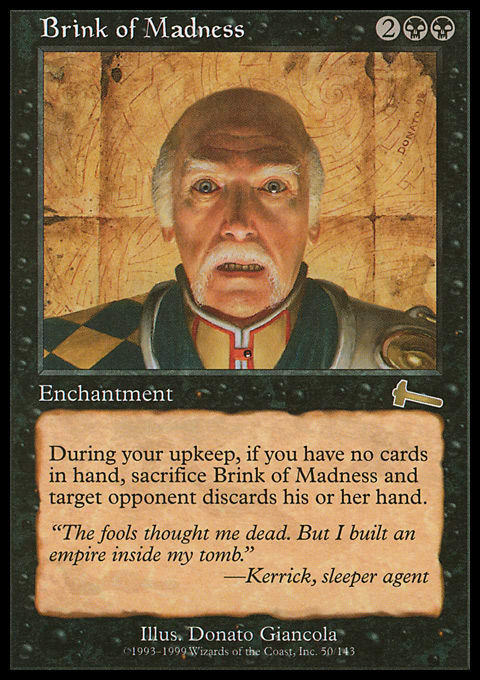First up: it's request hour!
Requests For Next Week! What would you like to see me write about?
Thank you for your humble contributions to market research.
Now then, back to the stupid things Magic players say.
#NotAllPlayers.
Seriously, don't take it personally. We all say ridiculous things! Overgeneralization is the hallmark of comforting, misleading BuzzFeedified Magic data. Just look at my article title! I'm no better!
So, no, it's not a universal truth; maybe there are good players in the world who have said some of these things...
...but probably not.
"This will kill [Insert Archetype Here]."
This is usually said when a new card, set, or ban announcement convinces players that a previously prominent deck will no longer be viable.
Depending on your interpretation, this either happens very infrequently or never.
Remember: My assertion isn't that singular occurrences, like a new card or a banning, can't render a previously established build of a deck as significantly worse. Hell, that's what bannings are usually for. But that is historically the absolute most forgiving case scenario, and that's only when a pointed ban announcement is involved.
As for new cards? Give me a break.
"Great Sable Stag will kill Faeries."
"Timely Reinforcements will kill the red deck."
Nah, probably not.
Why does this happen all the time? Well, there's some subtle power of suggestion as well as some new toy bias.
Caw-Blade | Mirrodin Beseiged Standard| Brian Kibler, Pro Tour Paris
- Creatures (8)
- 4 Squadron Hawk
- 4 Stoneforge Mystic
- Planeswalkers (7)
- 3 Gideon Jura
- 4 Jace, the Mind Sculptor
- Instants (9)
- 1 Deprive
- 2 Mana Leak
- 2 Stoic Rebuttal
- 4 Spell Pierce
- Sorceries (8)
- 4 Day of Judgment
- 4 Preordain
- Artifacts (2)
- 1 Sword of Feast and Famine
- 1 Sylvok Lifestaff
- Lands (26)
- 4 Island
- 4 Plains
- 1 Arid Mesa
- 1 Scalding Tarn
- 4 Celestial Colonnade
- 4 Glacial Fortress
- 4 Seachrome Coast
- 4 Tectonic Edge
- Sideboard (15)
- 1 Baneslayer Angel
- 1 Deprive
- 2 Divine Offering
- 1 Elspeth Tirel
- 2 Flashfreeze
- 4 Oust
- 3 Ratchet Bomb
- 1 Sword of Body and Mind
The former happens because when you've played in a format full of Jace, the Mind Sculptor, and it's obvious to you that it was important to Wizards of the Coast R&D that Jace, the Mind Sculptor be a prominent part of your Magic life, when the brand new preview card having text that blatantly interacts with Jace, the Mind Sculptor, it's suggested to you by R&D that this is the card you should play to help defeat the status quo of all these Jace, the Mind Sculptors.
The hazy (but obvious upon reflection) forces at work here are: 1.) Wizards R&D is a closed system that can only have access to the evolution of their own internal metagame; they cannot accurately produce the results that the worldwide player base will draw, so their "suggestion" is often based on small data in a big system. 2.) There is more to Magic games than the text on the cards. Players spend an overwhelming majority of time thinking about how the text boxes on cards interact without thinking about how they interact with the other 71 cards in decks, the importance of costs and card types, the relevant removal and counterspells in the format, and the play patterns that define the format's most powerful matchups.
So no. Faeries will have a slightly lesser share of the metagame (and adapt a third color), Red decks will adopt Black to go even further into deep life totals instead of doing the bare minimum 20 as fast as possible, and Jace, the Mind Sculptor will continue to ruin Standard.
Shiny new toys are rarely if ever as good as they look in the package. You're wrong.
"It gets better after sideboard."
The player wants to feel better about a suggested bad matchup. This comes out of their mouth reflexively. A tale as old as sideboarding.
Is it accurate? Well, maybe.
"Well, I'd hope so," or "No, it doesn't," is the best retort, depending on the situation.
So in the obvious "Well, I'd hope so," scenario: I expect this is self-explanatory. If there's a subset of players that believe in a strategy where they intentionally make their decks worse for games two and three - note that lots of players, myself included, make their decks unintentionally worse - then I'll revise this view. Until then, I don't think we need to make a note that we find it strategically advantageous to improve our decks when given opportunities in the middle of competitive play.
That just leaves "No, it doesn't." This is probably the more appropriate answer a majority of the time. Because most players saying these words have no idea. Sideboard games are undertested, they're dynamic, and by pure matter of the fact that every player building their sideboard is doing so in a speculative fashion for a tournament they have not yet played in, the targets they're choosing for those sideboard cards have not even yet been verified. The only way to state that you have reason to believe your sideboard provably makes a matchup better is if it's happening late in a tournament you're already in. And in that instance, your sample size is small and lousy. So you're still functionally wrong, just less so than everyone else. Good run, by the way.
"Magic is getting too dumbed down."
No, it isn't.
"This will kill Magic."
At this point, our extinction as a species is Magic's greatest existential threat.
Relax. It's going to be okay.
"I gave that game away."
I know. I noticed. You want to know how? I'm a better player than you. How can I have the nerve to say that? I didn't give the game away and you did.
Okay, but seriously.
This sort of goes along with "I should've won," which is the most paradoxical attitude in the history of tournament Magic. There's a mental falsehood, an incorrect and counterintuitive neural trigger where we file away losses that we would've won given one small factor in the late game as somehow different or more unjust than games that were lost through more subtle or outright invisible pivot points at some earlier stage of play.
If you have trouble conceptualizing this, imagine that the cards on the top of your deck have to come to you in some certain order and that that order is established before you see which cards you draw. Now imagine the same is true for your opponent. Now stop imagining because that's what actually happens.
Just because you're excited about what you drew doesn't mean it's new information to reality itself. By the time you've lost the game, the cards were already shuffled - in some cases several times. If you could see those cards, would you have made the same decisions? Of course not, because perfect information changes the fabric of what perfect play even is, and without the interaction of an opponent to contextualize it, we don't have any meaning for either. So why discriminate on where the deficiency was between you and your opponent at all?
Better players screw up less. This is not revolutionary data to anyone.
Let's try to apply the "It's important for me to announce I messed up because somehow that makes me feel more credible" logic to other situations:
"Yes, Lebron James is better than your stepdad at basketball, but that's only because Lebron doesn't fall on his ass in the driveway."
"I totally would've won that if I hadn't turned into the wall on the last lap instead of driving to the finish line."
"You only got everything in the divorce because I slept with my boss."
In what way is any of this less ridiculous than Magic's patented "You only won because I'm inept" defense?
Just shake hands, baby. Let there be luck, fun, love, and as little delusion as possible. You'll get 'em next time.
"It just dies to removal."
Thank you, Kai Budde.
"This hand is terrible, but if my top card is a spell/land it's insane."
Important guideline: If you can't prove what you're talking about to a stranger, don't say it. It's just weird, man. You're not going to show me your hand. You're not going to elaborate on what you're talking about. Just mulligan or lay a land, friend!
We can speak in lazy colloquialisms after we're off the 50:00 round clock.
All right, that's enough for now. Contemplate your favorite/least favorite Magic parrotings in your social discourse arenas of choice.
Oh wait! I thought of one more thing I hate to hear!
"This is a Good Seven, but I Think I can Get a Better Six."
Shudders.

































